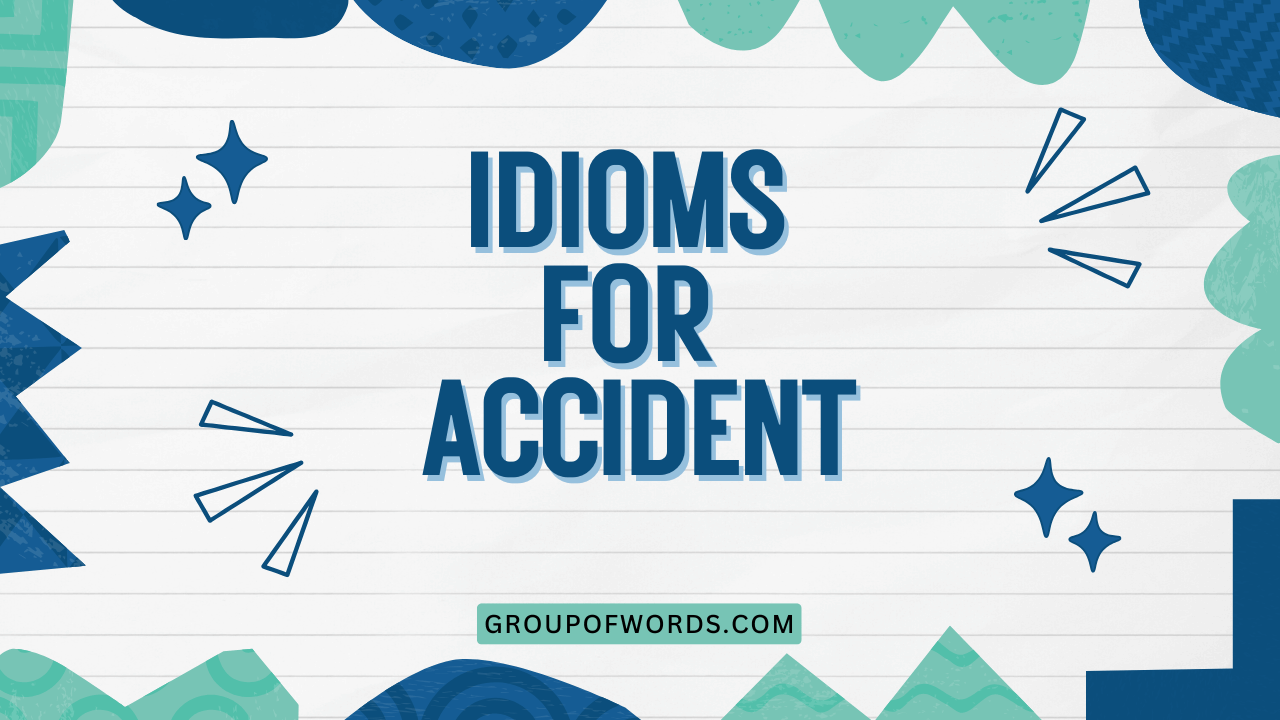Idioms for Accidents: A Comprehensive Guide
Accidents, unfortunately, are a part of life. Whether it’s a minor fender-bender or a more significant mishap, knowing how to describe these events accurately and vividly is essential.
While factual reporting is crucial, idioms add color and nuance to our language, making it more engaging and relatable. This article delves into a variety of idioms used to describe accidents, exploring their meanings, origins, and appropriate contexts.
Mastering these idioms will not only enhance your understanding of English but also enable you to communicate more effectively and expressively. This guide is suitable for English language learners of all levels, from intermediate to advanced, as well as native speakers looking to expand their idiomatic vocabulary.
Table of Contents
- Introduction
- Definition of Idioms for Accidents
- Structural Breakdown of Accident Idioms
- Types and Categories of Accident Idioms
- Examples of Accident Idioms
- Usage Rules for Accident Idioms
- Common Mistakes with Accident Idioms
- Practice Exercises
- Advanced Topics: Nuances and Regional Variations
- Frequently Asked Questions
- Conclusion
Definition of Idioms for Accidents
Idioms are phrases or expressions where the meaning cannot be understood from the literal definitions of the individual words. Instead, they carry a figurative or symbolic meaning that is culturally specific.
Idioms related to accidents are phrases that describe mishaps, incidents, or unfortunate events in a non-literal way. These idioms can convey the severity of the accident, the surprise element, the responsibility involved, or even the near avoidance of an accident.
Classification: Accident idioms can be classified based on various aspects, such as the severity of the accident (minor, serious), the cause (carelessness, negligence), or the outcome (injury, damage). They often fall under figurative language categories like metaphors, similes, or hyperboles. Their function is to add color, emphasis, and emotional impact to descriptions of accidents, making them more engaging and memorable. The contexts in which these idioms are used are wide-ranging, from casual conversation and news reports to literature and legal settings, depending on the specific idiom and the tone it conveys.
Structural Breakdown of Accident Idioms
The structure of accident idioms varies greatly depending on the specific phrase. Some idioms are simple prepositional phrases, while others are more complex clauses or sentences.
Many idioms use common verbs associated with motion or impact, such as “hit,” “crash,” “slip,” or “fall,” but in a figurative sense. The words within the idiom are often used in a fixed order, and changing the word order or substituting words can alter or destroy the idiom’s meaning.
For example, the idiom “bite the dust” (meaning to fail or die) is a fixed phrase. Changing it to “dust the bite” or “chew the dirt” would not convey the same meaning.
Similarly, the idiom “a close call” (meaning a narrow escape from danger) cannot be effectively altered without losing its idiomatic force. Understanding the fixed nature of these phrases is crucial for using them correctly.
Types and Categories of Accident Idioms
Idioms for Sudden and Unexpected Accidents
These idioms describe accidents that happen quickly and without warning. They often emphasize the element of surprise and the lack of preparation.
Idioms for Minor Accidents
These idioms refer to small accidents that usually involve little or no serious damage or injury. They are often used humorously or to downplay the severity of an event.
Idioms for Serious Accidents
These idioms describe accidents that result in significant damage, injury, or even death. They often convey a sense of gravity and consequence.
Idioms for Blame and Responsibility in Accidents
These idioms relate to who is at fault for an accident and who bears the responsibility for the damages or consequences.
Idioms for Avoiding Accidents
These idioms describe situations where an accident was narrowly avoided, emphasizing the close proximity to danger.
Examples of Accident Idioms
The following sections provide examples of accident idioms, categorized by type.
Examples: Sudden and Unexpected Accidents
This table provides examples of idioms that describe sudden and unexpected accidents. Each idiom is defined and used in a sentence to illustrate its meaning.
| Idiom | Meaning | Example Sentence |
|---|---|---|
| Out of the blue | Unexpectedly; without warning | The accident happened out of the blue; one minute we were driving, the next we were spinning. |
| Like a bolt from the blue | A sudden and unexpected event | The news of the factory explosion came like a bolt from the blue. |
| Blindside someone | To surprise someone with something unexpected, often negative | The car blindsided me as I was crossing the street. |
| Come a cropper | To fall badly or fail | He came a cropper while skiing and broke his leg. |
| Take a tumble | To fall suddenly and awkwardly | She took a tumble on the icy sidewalk. |
| Slip up | To make a mistake | The driver slipped up and caused a three-car pileup. |
| Go pear-shaped | To go wrong; to fail | The project went pear-shaped when the main contractor had an accident. |
| Hit the skids | To begin to fail or decline rapidly | After the accident, his career hit the skids. |
| Go south | To deteriorate or fail | Everything went south after the accident at the plant. |
| Go belly up | To fail completely, especially financially | The company went belly up after the catastrophic accident. |
| Smash-up | A collision, typically involving vehicles | There was a terrible smash-up on the highway this morning. |
| Pile-up | An accident involving several vehicles | The fog caused a massive pile-up on the motorway. |
| T-bone | To hit the side of a vehicle, forming a T shape | Another driver T-boned her car at the intersection. |
| Sideswipe | To hit the side of something lightly while passing | He sideswiped a parked car while trying to parallel park. |
| Totaled | Damaged beyond repair | The car was totaled in the accident. |
| Write-off | Something that is damaged beyond repair or considered worthless | The vehicle was deemed a write-off after the crash. |
| Knock-on effect | A series of consequences caused by a single event | The accident had a knock-on effect, causing major traffic delays. |
| Domino effect | When one event causes a series of similar events to happen one after another | The initial collision caused a domino effect, resulting in a multi-car accident. |
| By accident | Unintentionally; without planning | I deleted the file by accident. |
| Inadvertently | Without intention; accidentally | He inadvertently caused the machine to malfunction. |
| Unwittingly | Without being aware; unintentionally | She unwittingly triggered the alarm. |
| Suddenly | Quickly and unexpectedly | Suddenly, the car swerved off the road. |
| All of a sudden | Very quickly and unexpectedly | All of a sudden, the lights went out, causing chaos. |
| Like a thief in the night | Unexpectedly and without warning | The earthquake struck like a thief in the night. |
Examples: Minor Accidents
This table provides examples of idioms that describe minor accidents, often involving little to no serious damage or injury.
| Idiom | Meaning | Example Sentence |
|---|---|---|
| Fender-bender | A minor car accident | It was just a fender-bender; no one was hurt. |
| A bump in the road | A minor setback or difficulty | The accident was just a bump in the road; we’ll recover quickly. |
| A slip-up | A minor mistake or error | It was just a slip-up; don’t worry about it too much. |
| A minor setback | A small delay or problem | The accident caused a minor setback to our plans. |
| A scratch | A slight mark or injury | The car only has a scratch; it’s nothing serious. |
| A scrape | A superficial injury or mark | He got away with just a scrape on his knee. |
| A ding | A small dent or mark | The car has a small ding in the door. |
| A prang | (British) A minor car accident | He had a little prang in the supermarket car park. |
| Brush with death | A close call; a near-death experience | It was a brush with death, but I’m okay. |
| Close call | A situation where danger was narrowly avoided | That was a close call; we almost crashed. |
| Near miss | A situation where an accident almost happened | It was a near miss; the plane nearly collided with the building. |
| Narrow escape | A situation where someone avoids danger by a small margin | He had a narrow escape when the tree fell. |
| By the skin of one’s teeth | Barely; only just | We avoided the collision by the skin of our teeth. |
| Just in the nick of time | At the last possible moment | The brakes worked just in the nick of time. |
| A glitch | A small problem or malfunction | There was a glitch in the system that caused a minor issue. |
| A hiccup | A minor problem or setback | The project had a few hiccups, but it’s back on track now. |
| A snag | A small problem or difficulty | We hit a snag during the installation, but we resolved it quickly. |
| A trivial matter | Something of little importance | The accident was a trivial matter; no one was seriously hurt. |
| No big deal | Not important; not a problem | It’s no big deal; I can fix it easily. |
| Not the end of the world | Not a disastrous or catastrophic event | The mistake isn’t the end of the world; we can learn from it. |
| A mere scratch on the surface | A superficial problem or issue | The damage was just a mere scratch on the surface. |
| A slap on the wrist | A mild punishment or reprimand | He got a slap on the wrist for the minor traffic violation. |
| Get off scot-free | To escape punishment or consequences | He got off scot-free despite causing the slight accident. |
Examples: Serious Accidents
This table provides examples of idioms that describe serious accidents, often resulting in significant damage, injury, or death.
| Idiom | Meaning | Example Sentence |
|---|---|---|
| A major catastrophe | A devastating event | The earthquake was a major catastrophe that claimed thousands of lives. |
| A tragic accident | An accident that results in death or great suffering | It was a tragic accident that left the community in mourning. |
| A fatal crash | An accident that results in death | The news reported a fatal crash on the highway. |
| A devastating blow | A shocking and harmful event | The accident was a devastating blow to the family. |
| A crushing blow | A severe setback or disappointment | The loss of life in the accident was a crushing blow to the entire town. |
| To meet one’s maker | To die | Several people met their maker in the plane crash. |
| To kick the bucket | To die | Unfortunately, he kicked the bucket as a result of the injuries sustained in the accident. |
| Six feet under | Dead and buried | He is now six feet under after the unfortunate incident. |
| Beyond repair | Irreparable; unable to be fixed | The damage to the building was beyond repair after the explosion. |
| Past the point of no return | A point after which it is impossible to go back | The situation was past the point of no return after the chemical spill. |
| An act of God | An event caused by natural forces, without human intervention | The insurance company classified the flood as an act of God. |
| A bolt from the blue | A sudden and unexpected disaster | The tsunami was a bolt from the blue that devastated the coastal region. |
| The worst-case scenario | The most unfavorable outcome | The accident represented the worst-case scenario for the company. |
| A black day | A day of tragedy and mourning | The day of the factory explosion was a black day for the community. |
| A dark day | A day of sadness and misfortune | The day the bridge collapsed was a dark day in the city’s history. |
| A wake-up call | An event that serves as a warning | The accident was a wake-up call for the company to improve safety measures. |
| A rude awakening | A sudden and unpleasant realization | The accident was a rude awakening to the dangers of negligence. |
| A life-altering event | An event that significantly changes one’s life | The accident was a life-altering event for everyone involved. |
| A watershed moment | A turning point in history or in someone’s life | The disaster was a watershed moment in environmental regulations. |
| A game-changer | Something that significantly alters the course of events | The safety improvements were a game-changer and prevented future disasters. |
| A nail in the coffin | Something that contributes to the downfall of something | The accident was another nail in the coffin for the failing business. |
| The last straw | The final problem in a series of problems that makes someone unable to cope | The accident was the last straw that led to the CEO’s resignation. |
| Go up in flames | To be destroyed by fire; to fail spectacularly | Their dreams went up in flames after the catastrophic fire. |
Examples: Blame and Responsibility
This table provides examples of idioms related to blame and responsibility in accidents.
| Idiom | Meaning | Example Sentence |
|---|---|---|
| To foot the bill | To pay for something, often reluctantly | The company had to foot the bill for the damages caused by the accident. |
| To take the blame | To accept responsibility for something wrong | He took the blame for the accident, even though it wasn’t entirely his fault. |
| To shoulder the responsibility | To accept responsibility | The manager had to shoulder the responsibility for the safety breach. |
| To be held accountable | To be responsible for one’s actions | The driver was held accountable for causing the accident. |
| To point the finger | To accuse someone of something | Everyone was pointing the finger after the accident, trying to avoid blame. |
| To pass the buck | To avoid responsibility by passing it on to someone else | The politicians kept passing the buck instead of addressing the issue. |
| To carry the can | To take the blame or responsibility for something | He was left to carry the can after the project failed. |
| To face the music | To accept the consequences of one’s actions | He had to face the music after causing the accident. |
| To get one’s comeuppance | To receive what one deserves, often in the form of punishment | He finally got his comeuppance after years of negligence. |
| To be at fault | To be responsible for something wrong | The driver was at fault for running the red light. |
| To be to blame | To be responsible for something bad | The company was to blame for the environmental disaster. |
| To have a hand in | To be involved in something, often negatively | He had a hand in causing the accident, even if indirectly. |
| To be the architect of | To be the creator or cause of something, often negative | He was the architect of the company’s downfall. |
| To answer for | To be held responsible for something | He will have to answer for his actions in court. |
| To pay the price | To suffer the consequences of one’s actions | They will pay the price for their negligence. |
| To be caught red-handed | To be caught in the act of doing something wrong | He was caught red-handed stealing from the company. |
| To be in the hot seat | To be in a difficult or uncomfortable position, often under scrutiny | The CEO was in the hot seat after the scandal broke. |
| To be on the hook | To be responsible for something, often financially | The company was on the hook for the cleanup costs. |
| To get off the hook | To avoid responsibility or punishment | He tried to get off the hook, but the evidence was overwhelming. |
| To be scapegoated | To be unfairly blamed for something | He felt like he was being scapegoated for the company’s failures. |
| To take the heat | To endure criticism or blame | The manager had to take the heat for the team’s mistakes. |
| To face the music | To accept the consequences of one’s actions | She knew she had to face the music after lying to the authorities. |
| To be brought to justice | To be held accountable for one’s crimes | The criminals were finally brought to justice after years of evading the law. |
Examples: Avoiding Accidents
This table provides examples of idioms that describe situations where an accident was narrowly avoided.
| Idiom | Meaning | Example Sentence |
|---|---|---|
| A close shave | A narrow escape from danger or disaster | That was a close shave; we almost crashed into the other car! |
| Dodged a bullet | Avoided a potentially harmful situation | We dodged a bullet when we decided not to invest in that company. |
| In the nick of time | Just before it’s too late | The firefighters arrived in the nick of time to save the building. |
| By the skin of one’s teeth | Barely; only just | We escaped the flood by the skin of our teeth. |
| A near thing | A situation that almost resulted in disaster | It was a near thing when the scaffolding nearly collapsed. |
| A narrow escape | A situation where someone avoids danger by a small margin | He had a narrow escape when the tree fell right next to him. |
| Averting disaster | Preventing a catastrophe from happening | The quick action of the pilot succeeded in averting disaster. |
| Nip it in the bud | To stop something at an early stage | We need to nip the problem in the bud before it gets worse. |
| Steer clear of | To avoid someone or something | I always steer clear of that part of town after dark. |
| Keep at bay | To prevent something from approaching or affecting you | The new security measures helped to keep thieves at bay. |
| Ward off | To prevent something from harming you | Wearing insect repellent can help ward off mosquito bites. |
| Head off at the pass | To prevent someone from doing something by intercepting them | We need to head them off at the pass before they sign the contract. |
| Bypass | To avoid something by going around it | The new road bypasses the city center, reducing traffic congestion. |
| Duck the issue | To avoid discussing or dealing with a problem | The politician tried to duck the issue during the interview. |
| Side-step | To avoid dealing with something directly | He cleverly side-stepped the question without giving a direct answer. |
| Walk a tightrope | To be in a precarious situation where one wrong move could lead to disaster | The company is walking a tightrope to avoid bankruptcy. |
| Tread carefully | To be cautious and avoid making mistakes | We need to tread carefully when dealing with this sensitive issue. |
| Look before you leap | Think carefully before taking action | Remember to look before you leap and consider all the consequences. |
| Better safe than sorry | It is better to be cautious than to take risks | I always double-check the door is locked, better safe than sorry. |
| Play it safe | To avoid taking risks | I’m going to play it safe and stay home tonight. |
| Proceed with caution | To move forward carefully and cautiously | We need to proceed with caution as we enter the negotiation phase. |
| Keep your wits about you | To stay alert and aware of your surroundings | You need to keep your wits about you when walking through a crowded area. |
| Have eyes in the back of your head | To be aware of everything that is happening around you | Good teachers seem to have eyes in the back of their heads. |
Usage Rules for Accident Idioms
Using accident idioms correctly requires understanding their specific meanings and the contexts in which they are appropriate. Here are some general rules:
- Context Matters: Choose idioms that fit the tone and formality of the situation. For example, “kick the bucket” is informal and would not be appropriate in a formal news report.
- Audience Awareness: Consider your audience’s familiarity with idioms. If you’re speaking to non-native speakers, it’s best to use idioms sparingly and explain their meanings.
- Literal vs. Figurative: Be mindful of the difference between the literal and figurative meanings. Using idioms literally can lead to confusion or misinterpretation.
- Fixed Expressions: Remember that idioms are usually fixed expressions. Changing the words or word order can alter or destroy the idiom’s meaning.
- Regional Variations: Be aware of regional variations in idiom usage. Some idioms may be more common in certain regions or countries than others.
Common Mistakes with Accident Idioms
One common mistake is using idioms out of context. For example, saying “He kicked the bucket at the fender-bender” is incorrect because “kicked the bucket” implies death, while “fender-bender” implies a minor accident.
Another common error is misunderstanding the meaning of an idiom and using it inappropriately. For instance, using “a walk in the park” (meaning easy) when describing a serious accident is completely inappropriate.
Here are some specific examples of common mistakes:
| Incorrect | Correct | Explanation |
|---|---|---|
| The accident was a walk in the park. | The accident was a major catastrophe. | “A walk in the park” means easy; it’s inappropriate for a serious accident. |
| He kicked the bucket in a fender-bender. | He suffered a minor injury in a fender-bender. | “Kicked the bucket” means died; it’s inappropriate for a minor accident. |
| They pointed the finger at themselves. | They shouldered the responsibility. | “Pointed the finger” means to blame others; “Shouldered the responsibility” means accepting the blame. |
Practice Exercises
Test your knowledge of accident idioms with these practice exercises. Choose the correct idiom to complete each sentence.
| Question | Options | Answer |
|---|---|---|
| The company had to ________ for the environmental damage caused by the spill. | a) face the music b) foot the bill c) pass the buck | b) foot the bill |
| The driver ________ when he ran the red light and caused the accident. | a) was at fault b) carried the can c) dodged a bullet | a) was at fault |
| It was a ________; we almost crashed into the truck. | a) close shave b) fender-bender c) wake-up call | a) close shave |
| The news of the factory explosion came ________. | a) in the nick of time b) out of the blue c) by the skin of one’s teeth | b) out of the blue |
| The accident was a ________ for the company to improve its safety standards. | a) nail in the coffin b) wake-up call c) walk in the park | b) wake-up call |
| He ________ and broke his leg while skiing. | a) came a cropper b) steered clear of c) kept at bay | a) came a cropper |
| The project ________ when the main contractor had an accident. | a) went pear-shaped b) foot the bill c) faced the music | a) went pear-shaped |
| After the accident, his career ________. | a) hit the skids b) foot the bill c) carry the can | a) hit the skids |
| The initial collision caused a ________, resulting in a multi-car accident. | a) close shave b) domino effect c) face the music | b) domino effect |
| We avoided the collision ________. | a) by accident b) by the skin of our teeth c) face the music | b) by the skin of our teeth |
Advanced Topics: Nuances and Regional Variations
For advanced learners, it’s important to understand the nuances and regional variations in the use of accident idioms. Some idioms may have subtle differences in meaning depending on the context.
For example, “a bump in the road” can refer to a minor accident, but it can also refer to a temporary setback in a project or relationship. Similarly, some idioms are more common in British English than in American English, such as “a prang” (British) for a minor car accident.
Furthermore, the cultural context can influence the interpretation of idioms. An idiom that is considered humorous in one culture may be seen as insensitive in another.
Therefore, it’s essential to be aware of these nuances and variations to use accident idioms appropriately and effectively.
Frequently Asked Questions
-
What is the difference between an idiom and a metaphor?
An idiom is a phrase whose meaning is different from the literal meaning of the words, while a metaphor is a figure of speech that directly compares two unrelated things. While some idioms can be metaphorical, not all metaphors are idioms. For example, “a bolt from the blue” is an idiom that uses a metaphor to describe a sudden event.
-
How can I improve my understanding of accident idioms?
To improve your understanding of accident idioms, read widely, pay attention to how native speakers use idioms in conversation, and practice using them yourself. You can also use online resources and language learning apps to study idioms and their meanings.
-
Are there any idioms that should be avoided in formal writing?
Yes, some idioms are too informal for formal writing. Avoid using slang or colloquial idioms in academic papers, business reports, or legal documents. Stick to more neutral and precise language in these contexts.
-
How do I know when to use an idiom versus literal language?
Use idioms when you want to add color, emphasis, or emotional impact to your writing or speech. However, be mindful of your audience and the context. If you’re unsure whether an idiom is appropriate, it’s often best to use literal language to ensure clarity.
-
Can the meaning of an accident idiom change over time?
Yes, the meaning and usage of idioms can evolve over time. Some idioms may become obsolete, while others may acquire new meanings. It’s important to stay up-to-date with current usage to avoid sounding dated or out of touch.
Conclusion
Mastering idioms related to accidents can significantly enhance your English language skills, allowing you to communicate more vividly and effectively. By understanding the meanings, origins, and appropriate contexts of these idioms, you can add depth and color to your conversations and writing.
Remember to consider your audience, the formality of the situation, and the potential for misinterpretation when using idioms. With practice and attention to detail, you can confidently incorporate accident idioms into your everyday language, enriching your communication and demonstrating a sophisticated understanding of English.






